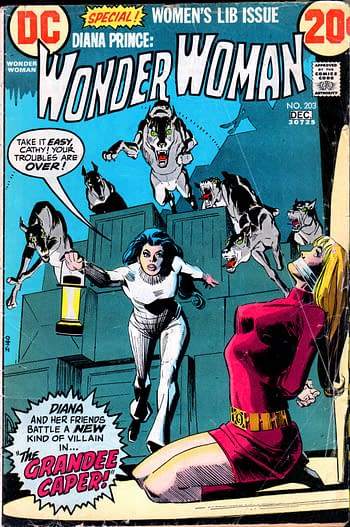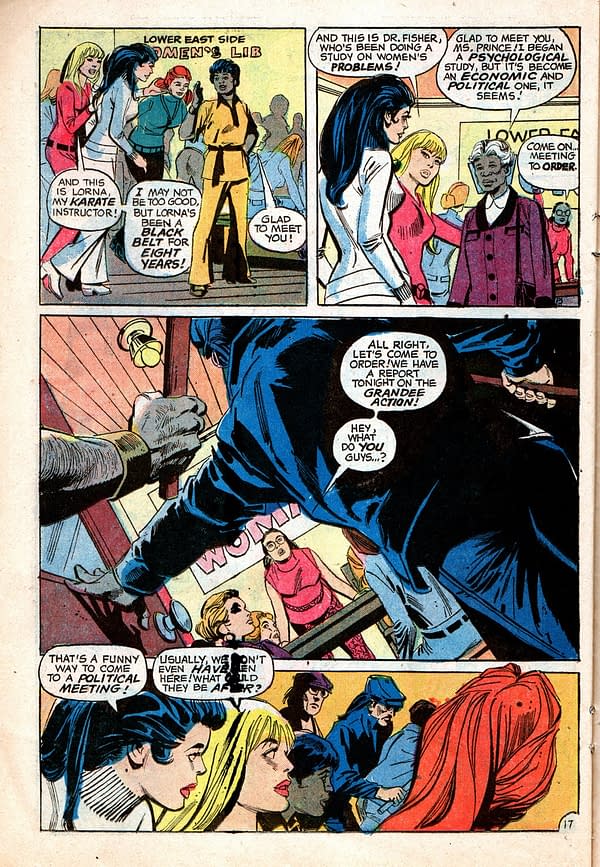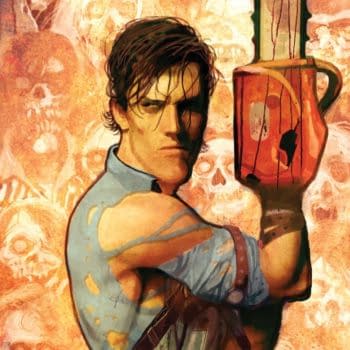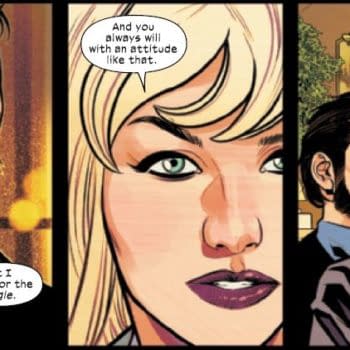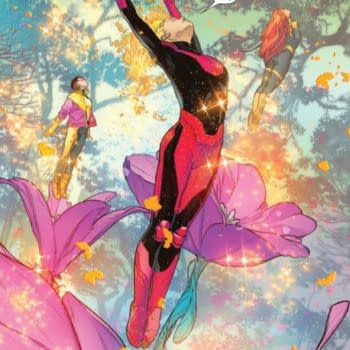Posted in: Comics, DC Comics | Tagged: dc comics, gloria steinem, wonder woman
How Gloria Steinem Stopped Wonder Woman Opening An Abortion Clinic
Gloria Marie Steinem is an American journalist and social-political activist who became nationally recognized as a leader and a spokeswoman for the American feminist movement in the late 1960s and early 1970s. A columnist for New York magazine, and a co-founder of Ms. magazine which featured Wonder Woman on its first issue cover, in 1969 Steinem published an article, After Black Power, Women's Liberation, which brought her to national fame as a feminist leader. In 1971, she co-founded the National Women's Political Caucus which provides training and support for women who seek elected and appointed offices in government. Also in 1971, she co-founded the Women's Action Alliance which, until 1997, provided support to a network of feminist activists and worked to advance feminist causes and legislation. In the 1990s, Steinem helped establish Take Our Daughters to Work Day, an occasion for young girls to learn about future career opportunities. In 2005, Steinem, Jane Fonda, and Robin Morgan co-founded the Women's Media Center, an organization that "works to make women visible and powerful in the media". But there may have been one moment that went awry.
Science fiction writer Samuel Delany talked about his relationship with former DC Comics editor and writer – and Bleeding Cool contributor – Dennis O'Neill and how that led to a Wonder Woman run that never was. He writes;
In 1968, under Denny as scripter and Mike Sekowsky as editor, they'd taken away Wonder Woman's powers and sexy costume to remain in "Man's World" rather than accompany her fellow Amazons back to Paradise Island, in Denny's words to me, "to solve the Superman problem," that is: if she can deflect bullets with her bracelet and tie up criminals with a magic lasso and fly around in a magic transparent plane, you run out of stories pretty fast—as well, it was just not making money and nobody cared about it. Denny was bringing in something that was really new: comics that deal with real problems of real people and, under the name of "relevant comics," they hit the front page of the New York Times magazine.
But comics were still considered kids' fair, though there were a small set of readers, like me, who were interested in it as a medium. Real writers—especially SF writers, notably Ray Bradbury—had comic stories before, written for comics. Would I consider writing Wonder Woman; Sure, I answered, if I could more less do what I want. Denny said, nobody's paying any attention to Wonder Woman. They let us do what we want with it.
So I said okay. First I wrote her out of the mindless S&S pickle she'd gotten in, somehow, in Fritz Leiber's Nehwon, with Ffard and the Gray Mouser (and Cat Woman!), and got her back home, where I could get her started on my six-issue story arc, that I plotted out in terms of six relevant "villains" (1) Department store owner, 2) Supermarket chain vs. A women'who represented groups who really exploited contemporary women's food co-operative, 3) College advisor suggesting women take home ec and stay away from the sciences, 4) & 5) a women's health clinic, where mammograms and abortions are available for women who request them which the women, with Wonder Woman, succeed in establishing.
Fifty years later, Wonder Woman opening an abortion clinic would still be the kind of thing that YouTubers would rage against. So what happened? Interference came from an unexpected direction.
For some reason Steinem was being shown through the DC offices, and so they showed her the "new wonder woman." All she saw that the old Wonder Woman was gone—and indeed had been gone for more than two years. (She certainly wasn't told why!) She was a good deal more famous than I was, and she had a magazine of her own: "MS-Magazine.") Wiki says she was offended. MY suspician was that she was simply surprised and nostalgic.
Though relevant comics had got them a front-page story on the Sunday "Times Magazine," the CEO's who were showing her through certainly didn't explain that, if they put her WW back in what kids on the street had been calling for years "her blue bikini and the American-flag falsies," and had all her magic powers back, it would make no sense that she was joining with a bunch of women on the lower east side to fight for what was essentially a women's health clinic (where, among other things, abortions would be available to women who wanted them).
The word came down that, next issue, that Wonder Woman was back with bullets and bracelets and magic lasso and her 1940's costume. I had to say, sadly, to Denny, "Look. My story arc can't be adjusted back to the old wonder woman. I didn't take this on for money—I took it on for love of what you had been doing: stories about real problems. I don't want or need to be a comic book writer—so I'm dropping out now." He understood, and that was the end of it.
I do wonder, though, if anyone ever explained to Stienem that a chance remark she made in the DC office was used, basically, to bring one of the most interesting movements in American commercial comics to an end—and keep all mention of things like health clinics, food co-ops, etc., out of commercial comics.
Steinem grew up reading Wonder Woman comics, and co-published the first hardcover collection Wonder Woman comic books, for which she wrote the introduction. She has also been one of Harvey Kurtzman's assistant editors on Help! Magazine and had met with Stan Lee a number of times. The reason she was at DC Comics was likely regarding putting Wonder Woman on the cover of Ms. for its 1972 launch, as a powerful woman in the classic recognisable costume of course, and this might have needed to have been reflected in the comic books as well. Ms was owned by DC Comics owner Warners after all,. and in both the 1970 hardcover and the 1972 magazine, the powerless and white costume of Wonder Woman was mocked. There was a campaign for those powers to be restored, with a costume as iconic as Superman's, and that's what happened. It's a shame that Delany never got a chance to pitch what he was doing – and why – to her. It's especially ironic given that Wonder Woman creator William Moulton Marston's mistress – and partial inspiration for the character – was the niece of Margaret Sanger, the activist who popularized the term "birth control", opened the first birth control clinic in the United States, and established organizations that evolved into the Planned Parenthood Federation of America…


